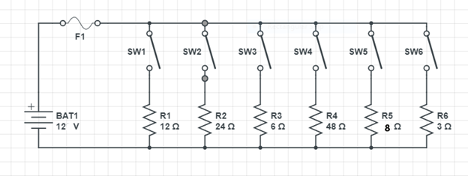Calculate the current through each Resistance R1 to R6 when its correspondent switch is closed (e.g. the current through R1 when the switch SW1 is closed, the current through R2 when the switch SW2 is closed, etc.) If the value of the Fuse F1 is 1 Amperes, which different combinations of switches can you close together to ensure that will be the maximum current possible but the Fuse F1 will not blow apart? – Justify your answer with your calculations. If the value of the Fuse F1 is 2 Amperes, which different combinations of switches can you close together to ensure that will be the maximum current possible but the Fuse F1 will not blow apart? – Justify your answer with your calculations.
Calculate the current through each Resistance R1 to R6 when its correspondent switch is closed (e.g. the current through R1 when the switch SW1 is closed, the current through R2 when the switch SW2 is closed, etc.) If the value of the Fuse F1 is 1 Amperes, which different combinations of switches can you close together to ensure that will be the maximum current possible but the Fuse F1 will not blow apart? – Justify your answer with your calculations. If the value of the Fuse F1 is 2 Amperes, which different combinations of switches can you close together to ensure that will be the maximum current possible but the Fuse F1 will not blow apart? – Justify your answer with your calculations.
Introductory Circuit Analysis (13th Edition)
13th Edition
ISBN:9780133923605
Author:Robert L. Boylestad
Publisher:Robert L. Boylestad
Chapter1: Introduction
Section: Chapter Questions
Problem 1P: Visit your local library (at school or home) and describe the extent to which it provides literature...
Related questions
Question
Part B
Given the following circuit:
- Calculate the current through each Resistance R1 to R6 when its correspondent switch is closed (e.g. the current through R1 when the switch SW1 is closed, the current through R2 when the switch SW2 is closed, etc.)
- If the value of the Fuse F1 is 1 Amperes, which different combinations of switches can you close together to ensure that will be the maximum current possible but the Fuse F1 will not blow apart? – Justify your answer with your calculations.
- If the value of the Fuse F1 is 2 Amperes, which different combinations of switches can you close together to ensure that will be the maximum current possible but the Fuse F1 will not blow apart? – Justify your answer with your calculations.
- If the value of the Fuse F1 is 3 Amperes, which different combinations of switches can you close together to ensure that will be the maximum current possible but the Fuse F1 will not blow apart? – Justify your answer with your calculations
- Calculate the minimum value of the Fuse F1 that will allow ALL the switches to be close.
6. Test your results using the simulation (Post Screenshot) https://phet.colorado.edu/sims/html/circuit-construction-kit-dc/latest/circuit-construction-kit-dc_en.html

Transcribed Image Text:F1
BAT1
12 V
SW1
R1
1202
SW2
ww
R2
24
SW3
O
R3
622
SW4
www
R4
482
SW5
ww
R5
802
SW6
R6
Expert Solution
This question has been solved!
Explore an expertly crafted, step-by-step solution for a thorough understanding of key concepts.
Step by step
Solved in 5 steps with 4 images

Knowledge Booster
Learn more about
Need a deep-dive on the concept behind this application? Look no further. Learn more about this topic, electrical-engineering and related others by exploring similar questions and additional content below.Recommended textbooks for you

Introductory Circuit Analysis (13th Edition)
Electrical Engineering
ISBN:
9780133923605
Author:
Robert L. Boylestad
Publisher:
PEARSON

Delmar's Standard Textbook Of Electricity
Electrical Engineering
ISBN:
9781337900348
Author:
Stephen L. Herman
Publisher:
Cengage Learning

Programmable Logic Controllers
Electrical Engineering
ISBN:
9780073373843
Author:
Frank D. Petruzella
Publisher:
McGraw-Hill Education

Introductory Circuit Analysis (13th Edition)
Electrical Engineering
ISBN:
9780133923605
Author:
Robert L. Boylestad
Publisher:
PEARSON

Delmar's Standard Textbook Of Electricity
Electrical Engineering
ISBN:
9781337900348
Author:
Stephen L. Herman
Publisher:
Cengage Learning

Programmable Logic Controllers
Electrical Engineering
ISBN:
9780073373843
Author:
Frank D. Petruzella
Publisher:
McGraw-Hill Education

Fundamentals of Electric Circuits
Electrical Engineering
ISBN:
9780078028229
Author:
Charles K Alexander, Matthew Sadiku
Publisher:
McGraw-Hill Education

Electric Circuits. (11th Edition)
Electrical Engineering
ISBN:
9780134746968
Author:
James W. Nilsson, Susan Riedel
Publisher:
PEARSON

Engineering Electromagnetics
Electrical Engineering
ISBN:
9780078028151
Author:
Hayt, William H. (william Hart), Jr, BUCK, John A.
Publisher:
Mcgraw-hill Education,